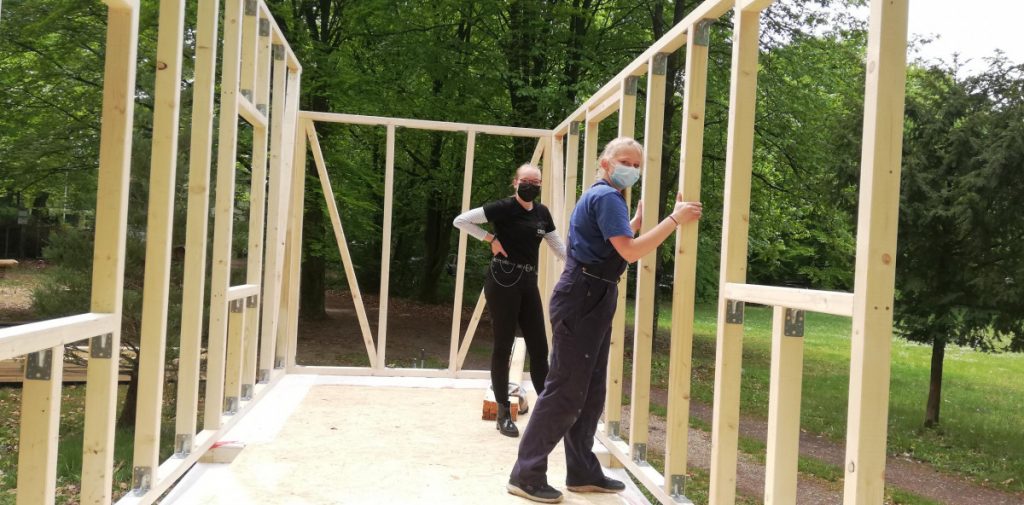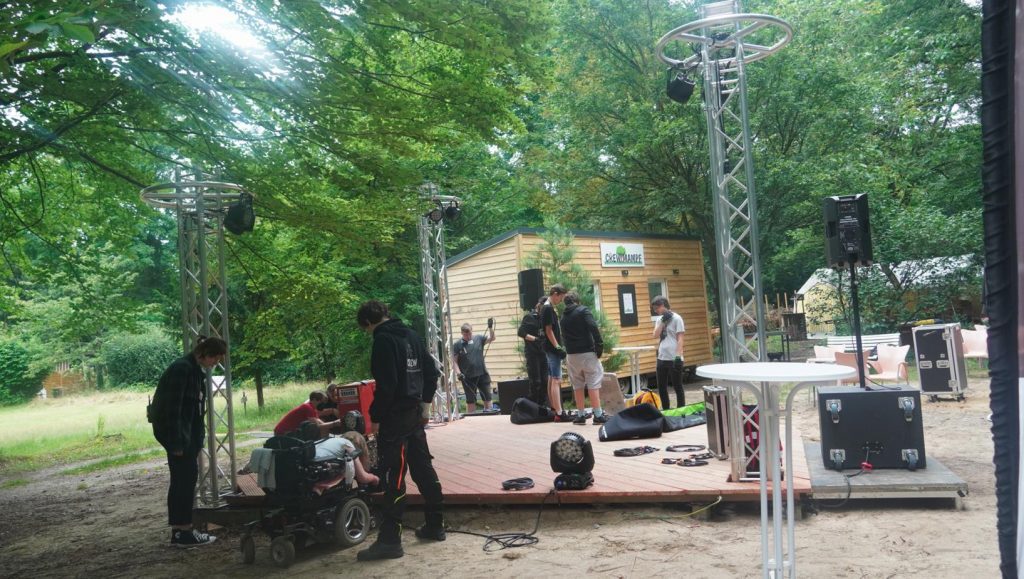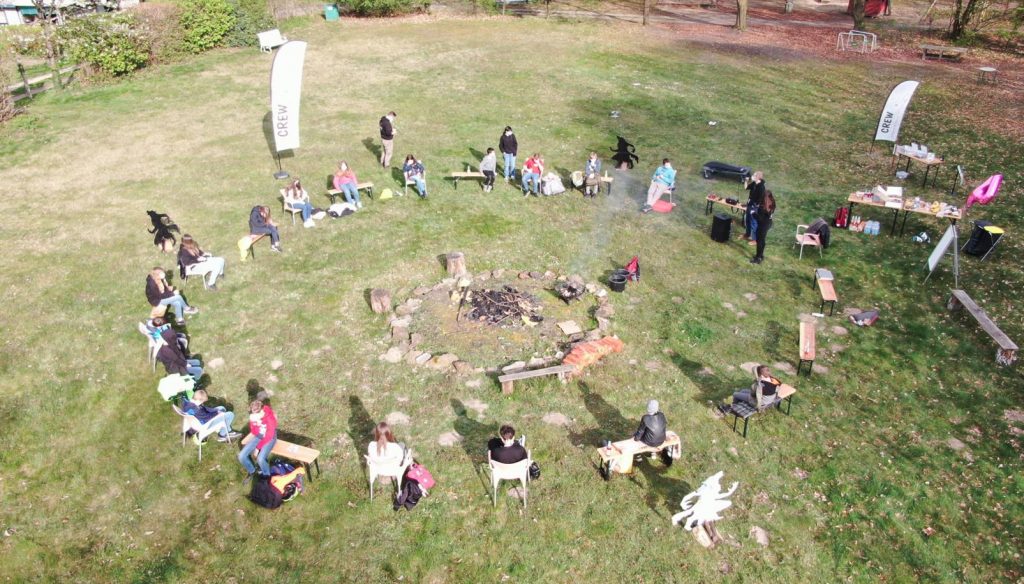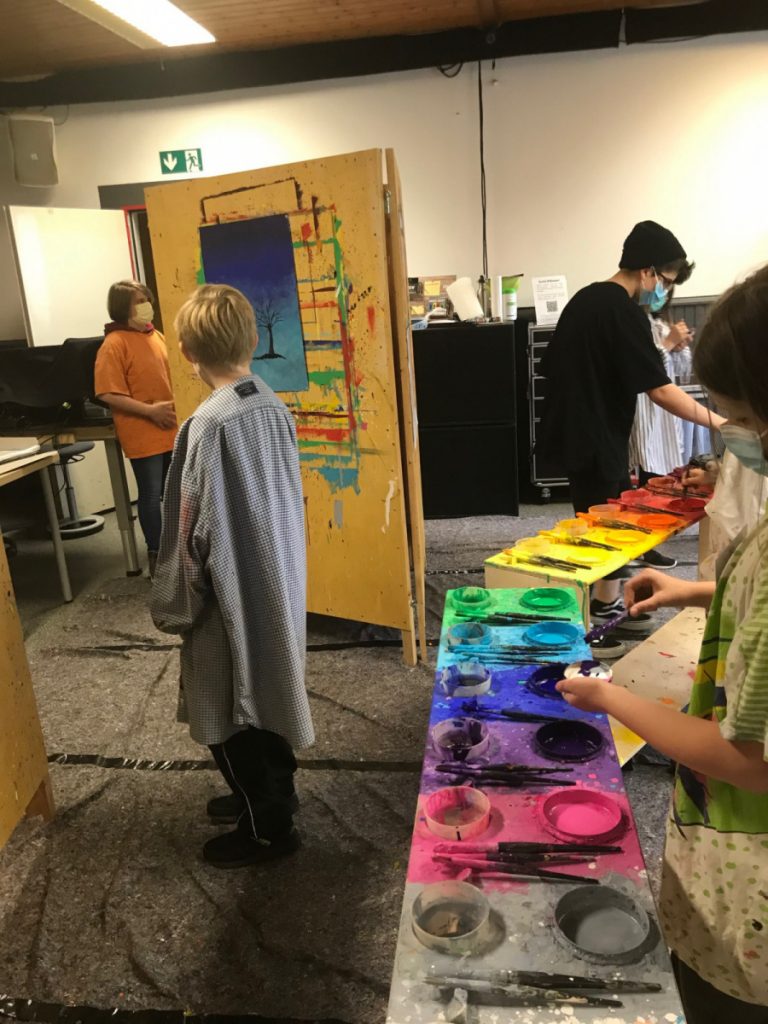
Sometimes clients surprise me when I learn from them “how to do it right”. By that I mean how quickly transformations that no one previously thought possible sometimes succeed. For several years now, I have been discussing how to continuously change and improve with the board of an association that has set itself the goal of redefining and shaping youth work. What makes CREW, as the association is called, special?
How many things come easily and naturally….
All their projects and activities are organised by the young people themselves, they are agile. When a project is launched, a group of interested people get together and tinker with a plan to realise the project and put it into action without a responsible manager making the final decisions. The youngsters seek professional support where necessary and otherwise “build” on their own. Impressive projects have been completed in this way:
– a concert and performance space, equipped with the finest equipment
– the design of a wonderful outdoor area with a permanently installed and thus safe fireplace
– a beach lounge with wooden sun loungers bearing the club’s logo,
– a site trailer built by the young people themselves, in which they run a bistro, observing all hygiene regulations and supervised by an “adult”. This personal responsibility goes so far that the bistro remains closed if the minimum necessary number of bistro staff has not registered for a Saturday or Sunday. Even if there is no income as a result! Fortunately, this has rarely happened so far.
– A stage equipped with sophisticated electrics (incl. a lighting system) has been built in the outdoor area. In the new year, permanent seating is to be built in front of it, in the style of a Greek theatre, so that a little “festival” atmosphere can arise.
The young people don’t ask whether something is allowed or not, whether it is feasible or not – it is done, with the goal firmly in mind. My experience in companies is sometimes different. Sometimes it seems difficult to embrace a culture of self-responsibility in all its facets. The other day, a client said to me: “But I have to check up on my employees! Otherwise they will do nothing or only what they want.“ Yes, the old idea of man! Monitoring is good, but it would be better to enable the team to assess the success of their own and others’ work and thus grow together.

A world without prohibitions? Yes, that is possible.
Summer camps and highly creative holiday offers locally, which many youth clubs organise, have their particularity at CREW through a reduced set of rules, but strong principles: there are virtually no prohibitions! Rather, there are appeals and regular dialogues, e.g. on the topic of “When and where do I use my smartphone at camp and where not?”
I heard that at camps organised by other associations, smartphones are collected at the beginning of the trip to stop the “dear little ones and older ones” playing so much. They are then allowed to have their mobile phones back for 1 hour a day. At CREW, things are quite different: here, the particular child/teenager decides for themselves how to deal with the technology. During the creative activities during the day and in the evening, each member quickly decides whether they want to surf or rather be with the others. And personal responsibility thus leads to more self-efficacy!
When companies are under pressure, I often experience that rules, prohibitions and cramping restrictions are imposed. This radically diminishes the employees’ personal responsibility, but reputedly increases senior management‘s ability to control. It would take trust, dialogue, transparency and time to develop the staff and enable them to decide for themselves in crisis situations what action would be sensible in the interest of the whole company. The situation could be brought under control so much quicker!
Strategy development with 55!
Of course, CREW is also economically successful. And everyone knows that success also entails increased administrative and project management costs. However, the responsible senior management for CREW only works on a voluntary basis, as is so often the case in associations. So new structures and processes have to be decided and implemented.
For this purpose, the association decided on a big strategy meeting! The CREW managers want to continue to be successful and are strategically reshaping their association, together with all those responsible!
A workshop was held in October as part of a “project week” to which all managers and team members were invited, intended to lead to commonly supported strategic outcomes. I had the great pleasure of running a strategy workshop with 55 (!) young people on one day of that week.
When I passed my Covid test with flying colours (only then was I admitted), I met 55 bright and curious people. I briefly introduced myself and my work, still under the illusion I had to apply who knows what didactic acrobatics to keep them “in check”. I quickly got over that: There were attentive and interested listeners sitting in front of me, who had already asked me questions during the introduction the evening before the workshop. How often do I participate in adult workshops and experience silence exactly when they could ask me questions? Asking means showing curiosity. Do you actually lose this as an adult?

All offers in the “project week” were organised like an Open Space event by the young people themselves, advertised in small units before the respective meal break and could be created directly using Teams and Outlook. Several large screens at different locations at the venue created transparency about workshops and available time slots. And to make sure that everything worked, the participants brought their own network with them, of course!
During a conversation on the eve of the strategy workshop, a board member warned me to watch my language, as not every participant would understand my consultant jargon. An important hint. So the next day I started with the request that they should report back to me immediately if I spoke gibberish that no one understood.
Then it got going: I have rarely experience so much creativity and forward thinking straight off. Everyone was immediately ready to come up with a picture of what the association could look like in the future and what contribution individuals wanted to make, without resistance, without discomfort. The ability to think from the present into the future, to imagine what an organisation of the future could look like, seems to happen much more easily with young people. You can learn a lot from “the young”! I am just imagining what a joint workshop with one of my “established” clients and CREW would look like….
There was also no problem at all with forming groups – another prejudice I had arrived with. Familiar friends split up as a matter of course to get to know the rest of the group better. Old hands mixed with newcomers. Throughout the day, the participants worked in ever-changing groups, sometimes moderated by their own board, to achieve sustainable results.
Strengths-based leadership – how cool is that?
When I had a short break in the morning, I found on the table with my documents a small card that said: “Dear Heike, you speak wonderfully. I can understand everything perfectly.” I was touched by this Kudo Card and it made me happy. That’s exactly what it’s supposed to do: Kudo Cards are a tool from the Management 3.0 world, which as a feedback instrument focuses on appreciation instead of highlighting critical things. The term “Kudo” comes from the Greek and means something like honour, glory and recognition. It is about congratulating colleagues on special achievements or simply saying thank you. On the table in the CREW plenary was a box with various self-made Kudo Cards with the CREW logo on them, saying for example “Thank you!”, “Well done”, “Great!” or “Congratulations”. Underneath, some lines were drawn on which the message could be written. The whole time, all kind of cards were written by the participants and distributed. How easy it is for young people to do good things that lead to a strength-based culture.

Recently, I tried to introduce Kudo Cards in an established company because the majority of the senior executives wanted to try them out. One manager, who was sceptical about this measure, said, “How does that look? I can’t just be nice to my employees now…. I’ll lose face!” Oh, what a shame, I thought, you are ashamed as an executive if you are supposed to be nice, just be nice and not nag all the time? Shame has a lot to do with the desire to maintain dignity in special moments. More on that in another article. But to be ashamed because one could be a strength-oriented leader, always makes me wonder.
We can learn a lot from young people. I’d love to learn much more.
We would like to thank the CREW association for their cooperation and the photos provided.
Original text: HFI
English translation: BCO

